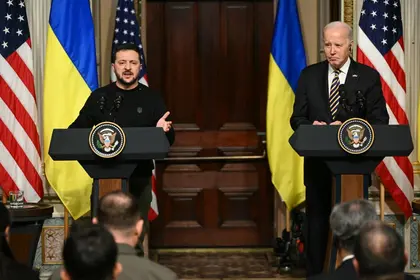A Ukrainian victory is a victory for the U.S. The next year should be marked by strategic resolve reflective of the critical importance of Ukraine winning for the U.S. and our national security. That resolve should then be matched to comprehensive and coherent strategy. As the world’s sole superpower and Ukraine’s most significant supporter, the U.S. should define and advance an endgame to the war.
That strategy should recognize a Ukrainian victory is less important for our long-term national security than is the concept of Russian defeat. Strategic resolve and the concomitant strategy are essential to U.S. national security as a Ukrainian victory would mean the preservation of the UN Charter and the international system that has brought stability and prosperity to the U.S. and the world for generations.
JOIN US ON TELEGRAM
Follow our coverage of the war on the @Kyivpost_official.
The fundamental American interest here is securing the survival and sovereignty of democratic states into the second half of the 21st century. In a basic sense, winning necessitates Ukraine liberating all of the territory Russia seized since February 2024, and likely the occupied Donbas seized in 2014. Liberating Crimea in this current hot phase of war will be challenging due to military realities.
Nevertheless, ending the hot phase of the war necessitates at least a partially demilitarized Crimea and an agreed path to resolve its status through an internationally monitored referendum that includes post-2014 refugees.

ISW Russian Offensive Campaign Assessment, November, 24, 2024
Winning also means Russia exiting the war with sufficient costs imposed to deter the Kremlin from engaging in major conventional wars for the foreseeable future. Such costs should include Russian asset forfeitures which could provide billions of dollars to help rebuild Ukraine. Such an outcome would deter Russia adventurism for years and other would-be aggressors worldwide from using military means to achieve their political objectives.
Currently, the policy debate and attendant actions in Washington and European capitals have all the rhetoric of an existential crisis, without the urgency to match. During the height of the Cold War, policymakers executed a far more coherent strategy to defeat Communism. In the 1950s and 1960s, the U.S. feared the domino effect of regimes falling to Communist ideology and thus engaged in everything from hyperactive diplomacy to multiple proxy wars to fend off the Soviet threat.
Not all our decisions under this framework were wise, as in the case of the Vietnam War, but America had a robust strategy, and few could doubt its commitment to global security in a time of great uncertainty. Arguably, the situation is now more perilous. If during the Cold War the threat was proxy warfare in remote corners of the globe, today’s threat involves a major power pursuing not just a sphere of influence, but territorial conquest right on NATO’s borders.
The U.S. government must adopt a coherent strategy and stop being consistently reactive to both Russia’s barbarous actions and the slow movement of reluctant allies. We must once again accept that the United States alone remains the indispensable nation, the arsenal of democracy, and the only country that can lead the coalition of democracies and take necessary actions to secure and advance democracy’s collective interest. Failing to do so risks the possibility of Russian success, enormous human casualties, a protracted war that directly threatens spillover onto NATO territory, and the fracturing of the world’s most effective military alliance.
As the U.S. coaxes Western European allies into action, it should partner ever more closely with Eastern European governments whose effectiveness as advocates for Ukraine stems from the living memory of suffering under Moscow’s occupation.
The Biden administration has previously acknowledged that allowing Russia to exit from this war with territorial gains would invite other authoritarian regimes to pursue their own empire-building exercises with impunity. A Russian political or military victory would manifest a 21st century governed by the rules of the jungle where might makes right and the strong prey on the weak. Every American dollar spent on Ukraine’s victory would be returned tenfold in its deterrent effect on adversaries such as China. Thus, U.S. support to Ukraine should aim to help Ukrainians liberate as much occupied territory as they can manage.
At a minimum, the Congress must pass President Biden’s request for $60 billion of aid to fund Ukraine’s defense through 2024. Additionally, the Biden Administration should show more urgency by lifting any remaining de facto prohibitions on weapon systems and accelerate weapons deliveries.
The United States should also swiftly deliver adequate logistical support to sustain and repair the numerous systems delivered and pledged by Western allies. It is a myth and a dream that Ukraine has the means to handle repair capability for the dozens of different types of equipment going into Ukraine. Between the absence of a supply parts’ distribution system, qualified repair teams, and indigenous training capability, Ukraine’s functional equipment rates hover at 30-50% for Western equipment. For comparison, the U.S. standard is 90% for operational readiness.
Washington has obstructed commercial sector efforts to build a Western logistics capability for Ukraine—an unnecessary and self-defeating error in judgment. There is of course no expectation that Ukraine will be able to match the U.S. military’s “super-power,” which is a near-limitless logistical base for all American operations, but even a token defense contractor presence operating in distributed bases on the ground can repair vast quantities of broken equipment.
For the foreseeable future, the U.S. and its allies must continue to provide Ukraine with increasing military support to liberate Russian-occupied territory. The American public needs to understand that support for Ukraine is a direct investment in U.S. defense and global stability; a security return on investment for only 5% of our annual defense budget and less than .25% of the U.S. GDP. This is a fraction of U.S. annual defense expenditure for America’s most important geopolitical crisis.
A dollar spent in aid for Ukraine not only serves to deter Russian aggression against NATO –– as Russia’s conventional military capability is rendered neutralized –– but also to deters China’s adventurism against Taiwan and it does so far more effectively than spending tens of billions of dollars to build another 2-3 aircraft carriers or arguably any other weapons systems.
Why It Matters: A Ukrainian victory would also be a victory for the U.S. It is an outcome that would lay a long-term basis for security and stability in Europe. The Ukrainians have shown tremendous ability and courage to fight, and it is up to us, the indispensable nation, to define a U.S. interest-based strategy and give Ukraine the tools to end this war swiftly to save the international system.
Reprinted from Why It Matters, a newsletter by Alexander Vindman about what's happening around the world and why It matters. See the original here.
The views expressed in this article are the author’s and not necessarily those of Kyiv Post.
You can also highlight the text and press Ctrl + Enter






